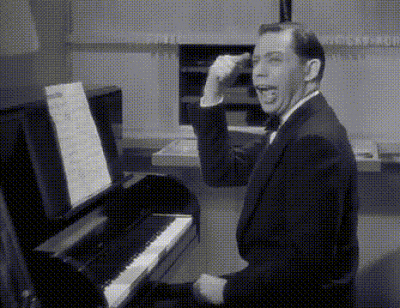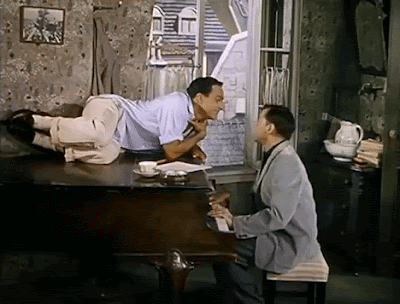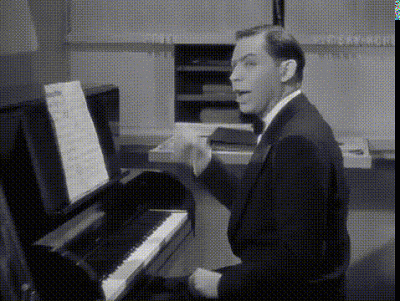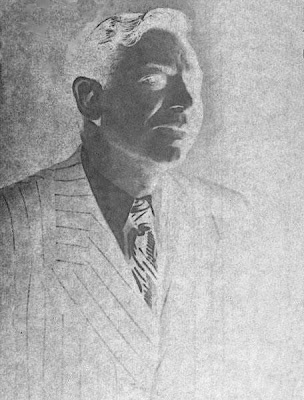Oscar Levant, Oscar Levant! I am too exhausted now from a truly gruesome sick-week to go into a long prologue about who he was, and what he has meant to me over the years. So I will just use a canned intro:
Oscar Levant (December 27, 1906 – August 14, 1972) was an American concert pianist, composer, music conductor, bestselling author, radio game show panelist and personality, television talk show host, comedian and actor. He was as famous for his mordant character and witticisms, on the radio and in movies and television, as for his music.
I just finished reading, or re-reading, a superb biography of Levant, A Talent for Genius: The Life and Times of Oscar Levant by Sam Kashner and Nancy Schoenberger. It's one of those "old friend" books that I re-read again and again for a certain kind of comfort. Through a lot of deep research and vibrant writing, the authors capture the Byzantine complexity of a figure so contradictory and fraught with paradox that it's hard to know how they ever pulled it off. Second only to the Marion Meade bio of Dorothy Parker, What Fresh Hell is This? (which I usually re-read back-to-back with the Oscar one), it's the best biography I've encountered among the at-least-a-hundred-or-so I have read and reviewed.
Oscar was almost hopelessly fxx'ed up, to say it politely, with a host of psychiatric ills that included bipolar disorder, OCD, runaway anxiety, intermittent paranoia, prescription drug addiction, and even a splash of benevolent narcissism. But there was so much more to him than that. Over the many years, his vast assortment of friends noticed and celebrated the little boy inside the man, the one who played hide-and-seek behind the great wall of his cynicism. A lifelong friend eulogized him thus: "For behind the facade of the world's oldest enfant terrible lurked the sweetest, warmest, most vulnerable man I've ever known. . . I loved him." Words such as "innocent" and "pure" crop up, confounding those who so completely bought his sardonic public persona. One doctor described him as an “extremely worthwhile human being”, a rather strange description which he set down in a formal medical report just as Levant was about to be thrown to the wolves of the psychiatric hospital system - again. He didn’t want his patient to be written off, forgotten about, or completely devoured.

Levant is mostly remembered as a razor wit, which I think was the very least of his almost frightening mass of talents. I refuse to quote even one of his "isms" here, because I am tired of them and no longer like to see them. He was, as writer and friend Christopher Isherwood described him, "completely unmasked at all times," and this unusually bare-faced quality startled, surprised, and (paradoxically) delighted people. He threw them completely off-guard and off-balance, but instead of being anxious or offended by it, they actually anticipated and enjoyed it. I can't think of another performer who did that, knew how, or could get away with it.
Turner Classics coincidentally happened to show 5 or 6 of his movies recently, with an embalmed-looking Michael Feinstein introducing them. His introductions mostly consisted of long chains of Oscar-isms which we've all heard dozens of times before. Feinstein is the perennial "Gershwin source" because he early on managed to cultivate George's sister-in-law Lee, and was thus handed a career as fetch-and-carry boy to Gershwin's memory. He also ingratiated himself with Oscar's glamorous actress-wife June, a more complex figure in Oscar's life than anyone else seems to recognize. It's never spelled out, but I can see the degree to which she acted as an enabler for Oscar's miasma of physical and mental miseries. As a child performer with a drunken Irish father, caretaking was second nature to her, the kind of support which is a knitting up and an unravelling at the same time.
When Oscar played, his face was usually masked, a “poker face”, which is odd given his otherwise “unmasked” quality. Sometimes he tipped his head back, but that's about all. Only rarely did you see any pleasure on his face when he played. He gave it, but couldn't feel it.
But here I want to insert a sentence that jumped out at me just this minute, when I randomly opened his bio: "While the Swopes' guests were gossiping or playing card games or croquet, someone would invariably be at the piano - George Gershwin, Deems Taylor, or Irving Berlin. Levant would take his place there as well, but only when no one asked. He would play only when he felt like it (see Dorothy Parker's perfectly accurate description of this, below), never on demand - but when he did he would play beautifully." This incredible Last Supper-like gathering of musical giants makes me want to say, "Pass the salt, Jesus".
His most energetic performance in The Band Wagon (a movie I just hate, though it's been called the best movie musical ever made) came just six weeks after he nearly died of a serious heart attack and refused to go to the hospital, because he was terrified the insurance companies would dump him and he’d never work again. So he hunkered down at home with a hired nurse, barely recovering before he dove back into work under an unbreakable contract.
The appalling thing is, he was right - they WOULD have dumped him, maybe forever. He was the breadwinner in the family, so needed to work to raise his three musically-gifted daughters and send them to Julliard. As with Garland, this was an engineered addiction that ran him into the ground and even cut his life short. He did not play a version of himself in The Band Wagon, that musical dog's breakfast – it was really the only time he didn’t. In yet another strange Levantine twist, he based his character on his good friend Adolph Green, the man who wrote the script.
It was a heroic effort, and for those who didn't know the circumstances, he covered his pain as well as any broken man could. But he wasn't up to it and was quite literally risking his life. Though his wife June was loyal and no doubt loved him, she didn't stand in the way of any of this nonsense, and too often even seemed to encourage it. Indoctrinated as a child performer, her sense of "the show must go on" was amplified to the point of near-ruthlessness. Ironically, he told everyone on set that he had been in a mental hospital because it was "safer" than revealing his heart attack. I am not making this up!
But his mental illness was his thing, his “shtick”, and though everyone knew he was telling the truth, they found it hilariously funny. I still don't understand this and wonder if he appealed to the worst qualities of schadenfreude and sadism in his audience. He brought this on himself, of course, jacking open his chest to display his broken heart for shockingly comic effect - but what can you do when you’re down and nearly dead from mental illness? You “sell” it, which is what he felt he had to do.
He lived to be my age, and I love the way he died, taking a little nap upstairs while waiting for Candice Bergen to come over and interview him. It is the strangest but most beautiful death I ever heard of. But I have always felt that, one way or another, you die the way you live. I have a mental image of Oscar borne up on airy wings to Eternity, pianistic diamonds in a glittering spill behind him.
I can't say much more about all this, though I certainly could. Originally, I was going to do a comparison of Levant with Dorothy Parker. It's not the comparison that would be hard, but doing all the backstory on Parker, whom a lot of people probably won't even know about. The parallels between them are surprisingly many. They sometimes crossed paths, had friends in common, liked each other, and even wrote about each other with great admiration and affection. Oscar eulogized Dorothy:
". . . a tiny woman, fragile and helpless, with a wispy will of iron. She loved dogs, little children, President Kennedy, and lots and lots of liquor. Even her enemies were kind to her; she brought out the maternal in everyone. At her cruelest, her voice was most caressive - the inconstant nymph. She was one of my favorite people."
And Dorothy on Oscar, no less a perfect encapsulation of the man's dizzying complexity:
"Over the years, Oscar Levant's image - that horrible word - was of a cocky young Jew who made a luxurious living by saying mean things about his best friends and occasionally playing the piano for a minute if he happened to feel like it. . . They also spread the word around that he was sorry for himself. He isn't and he never was; he never went about with a begging bowl extended for the greasy coins of pity. He is, thank heaven, not humble. He has no need to be.
He has no meanness; and it is doubtful if he ever for a moment considered murder. . .
Well. This was a losing fight before it started, this striving to say things about Oscar Levant. He long ago said everything about everything - and what Oscar Levant has said, stays said."
CODA. OK, there had to be one! I was fascinated to read that in his very first picture, John Garfield would play a character very closely based on his good friend Oscar Levant. This was in a movie called Four Daughters, and this clip might give you an idea of how well he pulled it off.
Amen.



















.jpg)
.jpg)






























